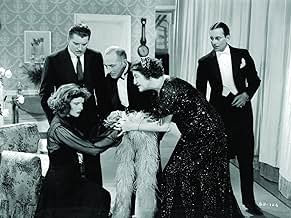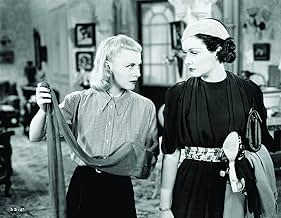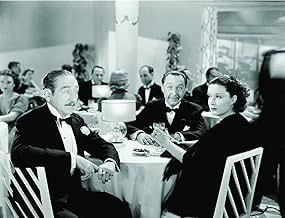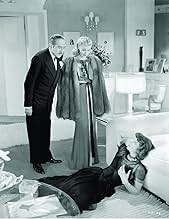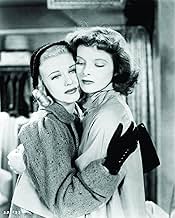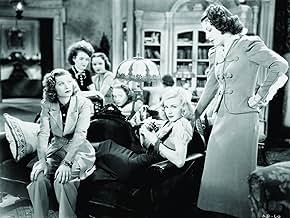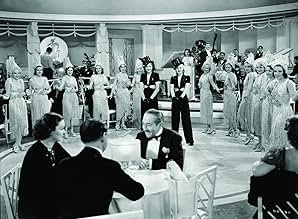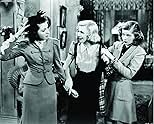IMDb-BEWERTUNG
7,7/10
9580
IHRE BEWERTUNG
Füge eine Handlung in deiner Sprache hinzuA chronicle of the ambitions, dreams, and disappointments of aspiring actresses who all live in the same boarding house.A chronicle of the ambitions, dreams, and disappointments of aspiring actresses who all live in the same boarding house.A chronicle of the ambitions, dreams, and disappointments of aspiring actresses who all live in the same boarding house.
- Für 4 Oscars nominiert
- 5 Gewinne & 5 Nominierungen insgesamt
Empfohlene Bewertungen
Framed and shot as though a stage play which it was originally, but much changed for the film and with a stage play within the staged play, le tout ensemble in this witty farce delivers a virtual non-stop, wise-cracking, virtuoso performance. Timing is everything and in comedy, it's particularly so; and the director, Gregory La Cava who cut his teeth, in the silent era, as a director beginning in 1916 doesn't miss a beat with this one.
From a play by Edna Ferber (of Giant fame) and George S. Kaufman, the film tells the story of what happens to a group of aspiring actresses who happen to board at a place called the Floodlights Club in New York City, supposedly. Of course, there are minor players, as in all plays Lucille Ball, Eve Arden, Ann Miller and most of the men, the exception being Adolphe Menjou as a caricature (almost) of the Big Bad Producer of those days. The majors, Katharine Hepburn (as Terry), Ginger Rogers (Jean), Gail Patrick (Linda) and Andrea Leeds (Kay) form the core about which this story revolves.
Which, when all is said and done, is about the ascendancy of Terry as an actress and the decline of Kay as another: out with the old, in with the new, if you will. That would tend to make for a somewhat pedestrian story if it were simply that. Happily, what sets this apart from, say, the almost maudlin characterization by Hepburn in Morning Glory (1933) in a similar situation (for which, however, she did receive a Best Actress award in 1934), is, first, the scintillating dialog. Which means the viewer must really listen: it goes so quickly between characters that you'll miss the one-liners and sight gags if you take a chomp on a sandwich or sip of coffee, or whatever. So, be prepared.
What's left? Well, of course, the great acting by Hepburn, Rogers, Ball, Miller, Menjou, Arden, Patrick and Leeds, the latter getting a Best Supporting nomination for her somewhat overly tearful acting; so much so, she reminded me of Olivia de Havilland, in looks and style.
The direction, already mentioned, is in the hands of an old hand and it shows, explicitly. Add to that the camera work that included almost manic cuts up and down stairs, superb face-on tracking shots and perfect timing while up to a dozen people would mill about in the frame concurrently and with dialog. Confusing? Perhaps to some. Just concentrate on the majors.
What's more interesting for me, however, is the sub-text of this comedy. Made just before USA finally shook free of the Great Depression, as you listen, you'll hear many references to the hard times: at the Floodlights, everybody is down, but not out; rich and unscrupulous producers just want to use and abuse actresses; the women are all scraping for even the lowliest acting or dancing job at the meanest of wages; despondency and depression are endemic. Despite all of that, the women 'soldier' on, pushing themselves to their emotional and physical limits.
Women in the audience at that time must have felt the pull: don't deny your dreams of self-fulfillment, despite what chauvinistic clods of men might say and do, even powerful men. It's a stirring message, albeit idealistic, but it sets the tone for the larger section of a country that was about to engage in the world war which, in a very real sense, changed the role of women as never before. So, some may die, yes, but the show must go on...
There have been a number of introspective and self-referential films about the acting business, Morning Glory being the earliest I've seen. Others include A Star is Born (made and remade many times), All About Eve (1950) arguably the best, I think The Dresser (1983), The Player (1992), and others, but all heavy dramas. So, it's refreshing to find a gem that's prepared to treat the matter lightly, more rather than less.
A final thought: it must have been fun for the actors to act at being actors; it's even more fun to know that the director used much of the banter between the women off-camera to actually use in the film much to the playwrights' displeasure, so I understand.
Recommended for all.
From a play by Edna Ferber (of Giant fame) and George S. Kaufman, the film tells the story of what happens to a group of aspiring actresses who happen to board at a place called the Floodlights Club in New York City, supposedly. Of course, there are minor players, as in all plays Lucille Ball, Eve Arden, Ann Miller and most of the men, the exception being Adolphe Menjou as a caricature (almost) of the Big Bad Producer of those days. The majors, Katharine Hepburn (as Terry), Ginger Rogers (Jean), Gail Patrick (Linda) and Andrea Leeds (Kay) form the core about which this story revolves.
Which, when all is said and done, is about the ascendancy of Terry as an actress and the decline of Kay as another: out with the old, in with the new, if you will. That would tend to make for a somewhat pedestrian story if it were simply that. Happily, what sets this apart from, say, the almost maudlin characterization by Hepburn in Morning Glory (1933) in a similar situation (for which, however, she did receive a Best Actress award in 1934), is, first, the scintillating dialog. Which means the viewer must really listen: it goes so quickly between characters that you'll miss the one-liners and sight gags if you take a chomp on a sandwich or sip of coffee, or whatever. So, be prepared.
What's left? Well, of course, the great acting by Hepburn, Rogers, Ball, Miller, Menjou, Arden, Patrick and Leeds, the latter getting a Best Supporting nomination for her somewhat overly tearful acting; so much so, she reminded me of Olivia de Havilland, in looks and style.
The direction, already mentioned, is in the hands of an old hand and it shows, explicitly. Add to that the camera work that included almost manic cuts up and down stairs, superb face-on tracking shots and perfect timing while up to a dozen people would mill about in the frame concurrently and with dialog. Confusing? Perhaps to some. Just concentrate on the majors.
What's more interesting for me, however, is the sub-text of this comedy. Made just before USA finally shook free of the Great Depression, as you listen, you'll hear many references to the hard times: at the Floodlights, everybody is down, but not out; rich and unscrupulous producers just want to use and abuse actresses; the women are all scraping for even the lowliest acting or dancing job at the meanest of wages; despondency and depression are endemic. Despite all of that, the women 'soldier' on, pushing themselves to their emotional and physical limits.
Women in the audience at that time must have felt the pull: don't deny your dreams of self-fulfillment, despite what chauvinistic clods of men might say and do, even powerful men. It's a stirring message, albeit idealistic, but it sets the tone for the larger section of a country that was about to engage in the world war which, in a very real sense, changed the role of women as never before. So, some may die, yes, but the show must go on...
There have been a number of introspective and self-referential films about the acting business, Morning Glory being the earliest I've seen. Others include A Star is Born (made and remade many times), All About Eve (1950) arguably the best, I think The Dresser (1983), The Player (1992), and others, but all heavy dramas. So, it's refreshing to find a gem that's prepared to treat the matter lightly, more rather than less.
A final thought: it must have been fun for the actors to act at being actors; it's even more fun to know that the director used much of the banter between the women off-camera to actually use in the film much to the playwrights' displeasure, so I understand.
Recommended for all.
New York City. The Footlights Club is a theatrical boarding house where young women wait for the chance to make it big on Broadway. To deal with the disappointment & bitterness that can set in, they engage in wisecracks & gossip. Fiercely loyal to their friends, they can be wickedly spiteful to those that cross them. Always before them is their dream - to capture elusive success at the STAGE DOOR.
A wonderful film, fresh & sparkling, with great dialogue infusing its wit & drama. The rapid-fire cross talk is still a real treat for viewers - as is the chance to see several fine young actresses early in their careers.
The entire cast is excellent. Brash Katharine Hepburn is the new girl who quickly meets the `regulars': feisty Ginger Rogers, cynical Lucille Ball, wisecracker Eve Arden, lively Ann Miller, snobbish Gail Patrick & sweet Andrea Leeds. While the young ladies certainly get most of the attention, be sure not to overlook Constance Collier, terrific as Miss Luther the has-been actress. Growing old on bittersweet memories, she is a constant reminder to the others what, even with success, they still might become.
Adolphe Menjou gives his usual vivid performance as an immoral producer, while Samuel S. Hinds is good as Hepburn's father. Film mavens will enjoy spotting several familiar faces in uncredited roles: Jack Carson as a Seattle lumberman; Grady Sutton as a butcher's helper; Frank Reicher as a stage director; Franklin Pangborn, hilarious as a butler; and Ralph Forbes in the role of Hepburn's stage spouse.
A wonderful film, fresh & sparkling, with great dialogue infusing its wit & drama. The rapid-fire cross talk is still a real treat for viewers - as is the chance to see several fine young actresses early in their careers.
The entire cast is excellent. Brash Katharine Hepburn is the new girl who quickly meets the `regulars': feisty Ginger Rogers, cynical Lucille Ball, wisecracker Eve Arden, lively Ann Miller, snobbish Gail Patrick & sweet Andrea Leeds. While the young ladies certainly get most of the attention, be sure not to overlook Constance Collier, terrific as Miss Luther the has-been actress. Growing old on bittersweet memories, she is a constant reminder to the others what, even with success, they still might become.
Adolphe Menjou gives his usual vivid performance as an immoral producer, while Samuel S. Hinds is good as Hepburn's father. Film mavens will enjoy spotting several familiar faces in uncredited roles: Jack Carson as a Seattle lumberman; Grady Sutton as a butcher's helper; Frank Reicher as a stage director; Franklin Pangborn, hilarious as a butler; and Ralph Forbes in the role of Hepburn's stage spouse.
In fact this film version of a stage play by Edna Ferber and George S Kaufman, directed by Gregory La Cava is 70 years old and although it may show a wrinkle here or there - like having Adolph Menjou as the romantic lead - the youthful energy in the acting and dialog has surfed the waves of time unscathed. The bunch of girls populating the Footlights lodgings is a smashing crowd. Katharine Hepburn, brisk and Hepburnish already to the hilt. Ginger Rogers drinks, scratches and dances a duet with Ann Miller. Eve Arden, as usual, delivers the best one liners and Lucille Ball seems ready for a startling career. Andrea Leeds got an Oscar nomination and Constance Collier plays an over the hill actress that becomes Hepburn's minder, just like in real life. The film moves at an incredible speed and I defy you not to tear up when Hepburn makes her entrance with the Calla Lillies in bloom.
Katharine Hepburn takes up residence in a theatrical rooming house in "Stage Door," one of the great examples of ensemble acting in film.
Besides Hepburn, the film features Adolph Menjou, Lucille Ball, Ann Miller, Ginger Rogers, Andrea Leeds, Eve Arden, Constance Collier, and Gail Patrick.
Hepburn is a the daughter of a wealthy man who comes to New York to try her hand at acting. She talks a good game, but as we soon learn, she has no emotional understanding or connection to acting at all, approaching everything intellectually.
All of the women are pursuing careers in theater, some with more success than others, and Patrick has a sugar daddy (Menjou). Leeds is the tragic character, a star from the previous season who can't find work but is desperate for the lead in "Enchanted April."
The atmosphere created by director Gregory Lacava perfectly evokes the lively atmosphere of young women living together, sitting in the parlor complaining about food, men, and work or lack of it, as they sing, joke, play piano, strum the ukulele, and talk on the phone - all at once.
The acting is uniformly excellent, with each actress creating a unique character. Lucille Ball gives evidence of the comic timing that would make her one of the greatest TV stars of all time, and there are plenty of ironic one-liners to be had from Eve Arden, and Ginger Rogers matches her in sarcasm.
Ann Miller was supposedly 14 when she made this film; it doesn't seem possible but that was her story and she stuck to it. We do get to see a little bit of her tapping.
Andrea Leeds, bearing such a strong resemblance to Olivia DeHavilland, gives a touching performance as the doomed Kay, who does not have the emotional stability to withstand what can be a devastating career.
It's an extremely melodramatic role and rather than have her play against this, LaCava had her play to it, thus dating what could have stood as a compelling performance even today.
The climactic scenes toward the end are pure '30s, stripping the film of previous lightness and going into tragedy but are effective and real tear-jerkers. By the film's end, though, we've come full circle.
The film is based on the play of the same name which is actually quite different. The whole idea was probably based on the Studio Club in New York City. "Stage Door" is wonderful and the script, acting and direction make it a deeply satisfying experience.
Besides Hepburn, the film features Adolph Menjou, Lucille Ball, Ann Miller, Ginger Rogers, Andrea Leeds, Eve Arden, Constance Collier, and Gail Patrick.
Hepburn is a the daughter of a wealthy man who comes to New York to try her hand at acting. She talks a good game, but as we soon learn, she has no emotional understanding or connection to acting at all, approaching everything intellectually.
All of the women are pursuing careers in theater, some with more success than others, and Patrick has a sugar daddy (Menjou). Leeds is the tragic character, a star from the previous season who can't find work but is desperate for the lead in "Enchanted April."
The atmosphere created by director Gregory Lacava perfectly evokes the lively atmosphere of young women living together, sitting in the parlor complaining about food, men, and work or lack of it, as they sing, joke, play piano, strum the ukulele, and talk on the phone - all at once.
The acting is uniformly excellent, with each actress creating a unique character. Lucille Ball gives evidence of the comic timing that would make her one of the greatest TV stars of all time, and there are plenty of ironic one-liners to be had from Eve Arden, and Ginger Rogers matches her in sarcasm.
Ann Miller was supposedly 14 when she made this film; it doesn't seem possible but that was her story and she stuck to it. We do get to see a little bit of her tapping.
Andrea Leeds, bearing such a strong resemblance to Olivia DeHavilland, gives a touching performance as the doomed Kay, who does not have the emotional stability to withstand what can be a devastating career.
It's an extremely melodramatic role and rather than have her play against this, LaCava had her play to it, thus dating what could have stood as a compelling performance even today.
The climactic scenes toward the end are pure '30s, stripping the film of previous lightness and going into tragedy but are effective and real tear-jerkers. By the film's end, though, we've come full circle.
The film is based on the play of the same name which is actually quite different. The whole idea was probably based on the Studio Club in New York City. "Stage Door" is wonderful and the script, acting and direction make it a deeply satisfying experience.
8sol-
A very well acted classic drama with great characters that interact realistically when together, it is also supported by some fine acting. Katharine Hepburn is very strong and natural, and Ginger Rogers matches her, playing a witty and almost cynical character very well. Gail Patrick is great too, yet Andrea Leeds was the only cast member to go on to receive an Academy Award nomination, however she is the best of the bunch, giving life to a frail and emotionally unstable aspiring actress. It is a bit overly talkative, and it has at least one too many subplots going on, however the film presents such an interesting insight into the lives of wannabee actresses that these points hardly matter. It is indeed a little difficult to distinguish each of the supporting characters as individuals, and perhaps they could done with further development, but yet this factor is very much like how all the aspiring actresses in the world are: indistinguishable, until you get to know them - and how actresses get ahead in the world is a lot of what this film is about. The final few minutes of the film could have been chopped out; otherwise this is good viewing all the way through.
Wusstest du schon
- WissenswertesWhen Katharine Hepburn delivered her climactic stage speech, Gregory La Cava reduced it to only ten lines and filmed it on a closed set. He later brought in the actors and the extras in the audience and had them react to the filmed speech. Many of them broke down.
- PatzerThe band at Club Grotto, where Jean and Annie perform a dance number, includes a female vocalist who can be seen singing in the background, but no vocals are heard on the soundtrack.
- Zitate
Terry Randall: [delivering her opening speech in the play within the movie] The calla lilies are in bloom again. Such a strange flower, suitable to any occasion. I carried them on my wedding day and now I place them here in memory of something that has died.
- Alternative VersionenSPOILER: A shot of a man mowing the grass around Kay's grave is missing from some versions.
- VerbindungenEdited into Starring Katharine Hepburn (1981)
- SoundtracksPut Your Heart Into Your Feet and Dance
(uncredited)
Written by Hal Borne and Mort Greene
Danced by Ginger Rogers and Ann Miller
Top-Auswahl
Melde dich zum Bewerten an und greife auf die Watchlist für personalisierte Empfehlungen zu.
- How long is Stage Door?Powered by Alexa
Details
- Erscheinungsdatum
- Herkunftsland
- Sprache
- Auch bekannt als
- Entre bastidores
- Drehorte
- Produktionsfirma
- Weitere beteiligte Unternehmen bei IMDbPro anzeigen
Box Office
- Budget
- 952.000 $ (geschätzt)
- Weltweiter Bruttoertrag
- 8.835 $
- Laufzeit
- 1 Std. 32 Min.(92 min)
- Farbe
- Seitenverhältnis
- 1.37 : 1
Zu dieser Seite beitragen
Bearbeitung vorschlagen oder fehlenden Inhalt hinzufügen


